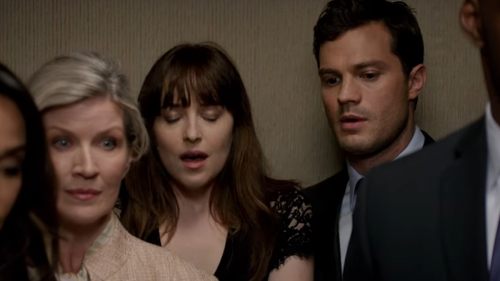FIFTY SHADES DARKER Review: From Awkward To Just Plain Dull
More so than the flawed but pleasantly neurotic Fifty Shades of Grey, Fifty Shades Darker is plagued by a frustrating lack of conflict. In contrast with the clash of personalities of the first installment, in spite of some bumps and a few pesky external factors, Ana and Christian talk out their problems and come up with mostly healthy solutions to their relationship issues in the second installment. Anastasia Steele, embodied with poetic awkwardness by Dakota Johnson, has a lot more confidence than in the previous film: she is comfortable with her body and is more willing to set boundaries. Christian Grey, torn by his newfound experience with love, seems a lot more willing to compromise on his unconventional desires in order to make his relationship work.
Inspired by largely adolescent-toned source material, the film is uncomfortably dictated by a prudish parental philosophy. The overall tone seems to condemn the sexual freedoms it depicts and does so by making sure anything too risky is reeled in. Every sex scene is cut to the rhythm of a new unsexy track and every single one feels cut painfully short of any kind of emotional or literal climax. The sex in the film does not push boundaries and any non-missionary sex is explained as a symptom of vague psychological traumas. The only daring thing about the film is its frequent depiction of cunnilingus, which is still largely a taboo in pop culture. As much as Anastasia yearns to have control as an independent woman and a sexually satisfied one, her desires are constantly limited by convention.
Doubling down on Anastasia’s ultimate desire to have a “normal” *(i.e. boring relationship), at every turn, Fifty Shades Darker steps away from discomfort. While Anastasia may be increasingly willing to push her own sexual boundaries it is only within the confines of a rigorously defined monogamous heterosexual relationship. Grey seems reformed and willing to change compared to his stoic inflexibility in the first installment. There are far more markers of a healthy relationship at work here than in the previous film (yay consent) but the film foregoes any real tension.
Sex within the film can only thrive within healthy boundaries where Christian is reformed and the couple will get married and try to be super normal. The film even goes so far as to have Christian propose three different times to Anastasia and at worst her response is coy apprehension the first time around. This restatement of marriage again and again is not met with any real pushback narratively. If anything, it only serves to emphasize how the text seems to judge the sexual acts it depicts. It almost seems that the sex is only okay as long as we know that Christian and Anastasia are in it for realsies - and even then it’s treated as taboo even though it's consenting adults doing low-risk sex stuff.
This kind of safety-net storytelling extends beyond just the sex though. In one baffling narrative choice after another, all possible conflict is diffused without any real struggle. One particularly egregious example is when Christian goes to Portland on business and then out of nowhere his helicopter catches some bad-fire CGI and starts plummeting towards the ground. For a solid three minutes Ana and Christian’s family fear the worst, but then happily the TV announces he was found totally okay and he emerges immediately from an elevator, a little worse for wear. The potential tragedy barely had time to set in before it is completely robbed of any narrative weight. And while this particular moment coincides with Christian’s first proposal, his near-death experience does not seem to have sway one way or another in Anastasia’s decision.
Like its predecessor, perhaps the film’s worst crime is an almost universal rejection of camp. The subject matter practically begs for an over the top treatment and rarely comes close to achieving it. Kim Basinger brings the goods in terms of delivering a performance that seems to be self-reflexive of how far-reaching the dialogue and relationships are and she is one of the film’s highlights. Her brief interactions with Marcia Gay Harden make you yearn for a movie where the pair swap insults and get into some sexy hijinks.
Fifty Shades Darker, ultimately, is a frustratingly benign film. Aside from featuring very beautiful people doing very beautiful things in a very beautiful city, the popularity of the series hinges on a largely female audience who hungers to have control over their sexual fantasies. It is telling that there are few films that fulfill that mandate, leaving a hungry audience thankful for stale scraps like this.



